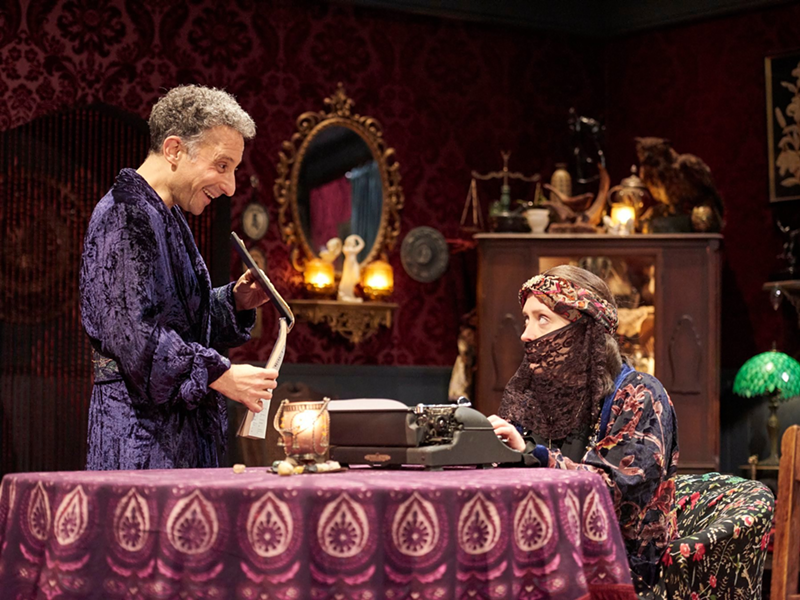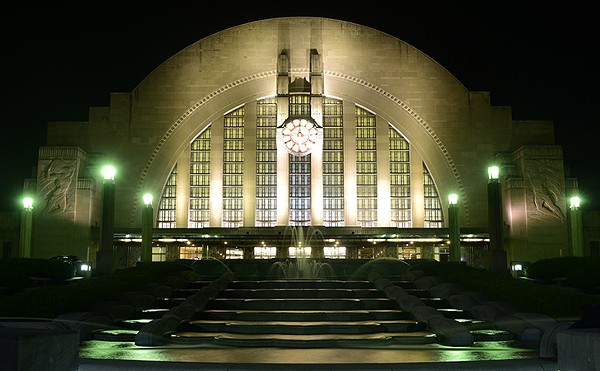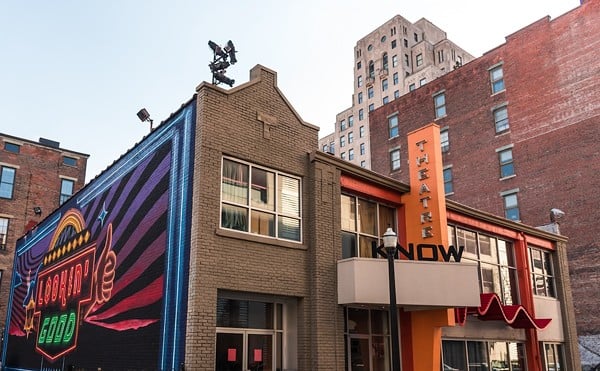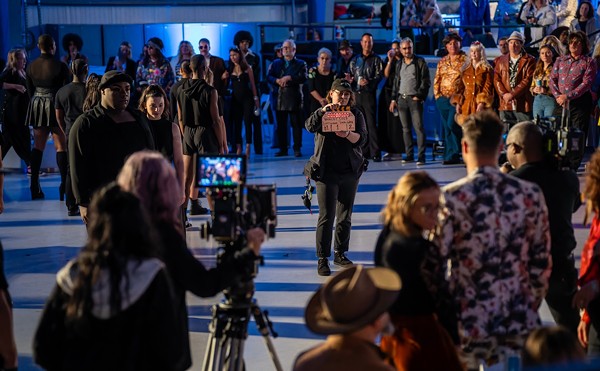Everybody dies. If we know our endings, then what’s the point?
Ensemble Theatre Cincinnati’s regional premiere of Fortune at first engages such nihilistic indifference but ultimately mines at something more humanistic: the idea that no matter how set in stone our life’s trajectory feels, change is possible. You just have to choose.
Playwright Deborah Zoe Laufer deftly conveys this message through a dynamic script that first introduces us to Madame Rosa, aka Maude (played by Kelly Menglekoch). Her grandmother and mother are both fortune-tellers, and she believes this is also her destiny. But peeling back the curtains of time and encountering the lives of strangers proves to be like any other job — tiresome.
Directed by Brian Robertson, that’s how the Fortune opens. Cranky and done with the day’s work, Maude sheds her robe and face veil, only to slip them back on when a thunderous knock comes at the door. Her efforts to shoo away the frantic patron prove futile, and so she lets a nerve-wracked Jeremy into her parlor.
Jeremy — a nebbish and plain accountant played by Jeremy Dubin — exudes nervousness. He at first poses questions that poke at something deeper than past and present. Why is he so alone, he asks.
He later queries: “Will I ever have anyone?” If not, he plans to kill himself.
Though she's in the business of truth, she lies and tells him he'll meet a red-haired woman on Saturday. But her fib changes his life’s destiny and, in turn, her own.
When you slide into your seat at ETC, you’ll likely first notice Brian c. Mehring’s lush and intricate set design. One half of the stage is Maude’s parlor, a space brimming with items: family photos, a large trunk, a crystal ball, heavy curtains, vintage lamps, a dressing screen and Persian rugs. In the center is a table — where Maude meets her clients — covered in patterned purple cloth. Surrounded by velvety-red wallpaper — and, elsewhere, exposed brick — a high-up window reveals a glimpse of the outside world. Matt Callahan's sound design often reflects the moods of the lighting to create an overall immersive experience.
The stage's other half, depicting the promenade, is bare in contrast. Backdropped by a painted city skyline, a bench anchors the stage and streetlights fade and flicker to mark the time. Open and airy, this is where Jeremy believes he’ll encounter his true love.
You’ll likely know where this rom-com is going from the start. But isn’t that the fun of such stories? This earnest two-person play grows warmer with each scene. Jeremy and Maude, Mengelkoch and Dubin — who are married in real life — orbit each other with expert precision, chipping away at one another’s insecurities.
Maude is guarded, a trait physically manifested through her costuming. For most of the play, she either hides portions of her face (via the veil) or transforms into someone else entirely (to keep up her lie to Jeremy, she disguises herself as multiple red-headed women). This detail is clever on the part of costume designer Amanda McGee. Through Maude's outfit changes, we see versions of who she believes she should be, who she really is and aspirations of who she hopes to be.
Jeremy, on the other hand, is so emotionally open that he struggles with awkwardness. He wants badly to not be alone and to share his love with someone other than the city pigeons he talks to on the promenade. Despite their stark differences, the pair have much in common. Both live in isolation and, as it turns out, love cherry baklava, among other things. As Jeremy returns week after week to update Maude on his quest to find the red-haired woman she spoke of — and, unbeknownst to him, costumes herself as — their connection grows stronger. Without realizing it, they begin creating rituals of their own. Between jokes (of which there are many), shared baklava and kind gestures, we see them catch feelings.
Their relationship unfolds with felt chemistry, delicacy and grace. Funny and sweet, Fortune is not only warm but serves as a reminder that we're only as limited by our so-called destiny as we believe ourselves to be.
Ensemble Theatre's Fortune runs through Feb. 15. For more info/tickets, visit ensemblecincinnati.org.







